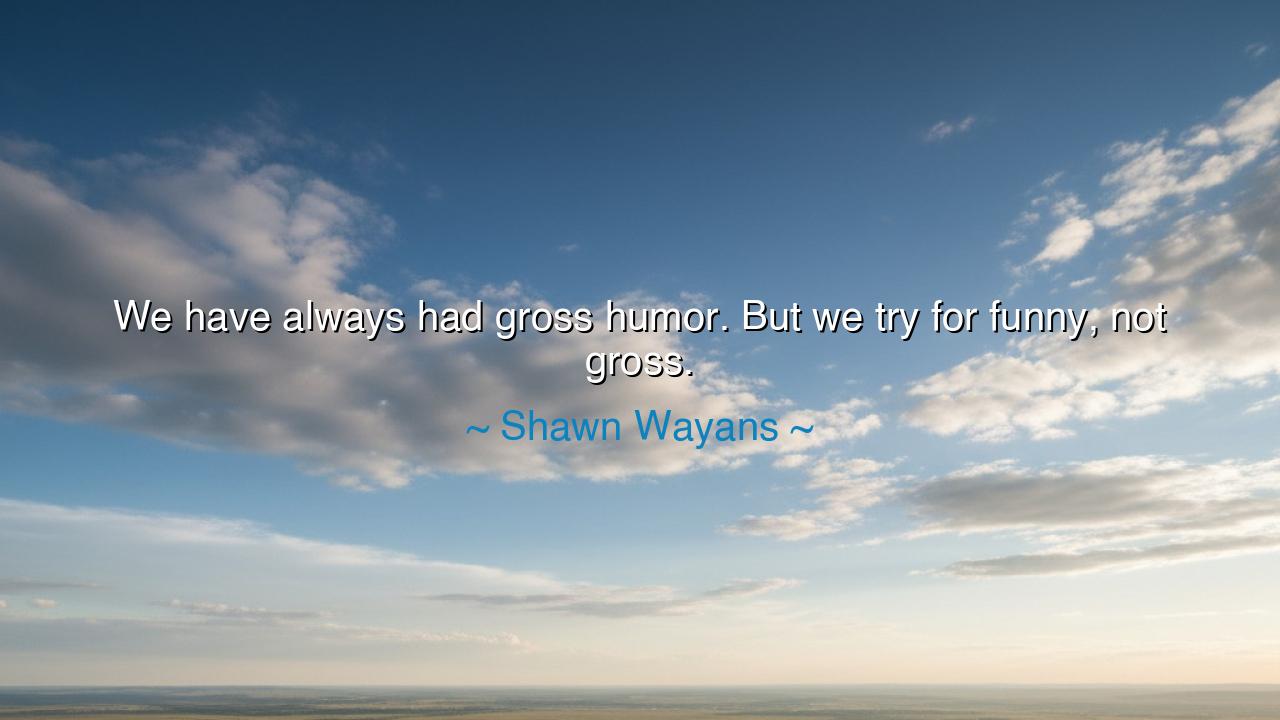
We have always had gross humor. But we try for funny, not gross.






“We have always had gross humor. But we try for funny, not gross.”
Thus spoke Shawn Wayans, a craftsman of laughter and a student of the ancient art of jest. In this saying, he reveals a truth deeper than mere comedy — a truth about intention, restraint, and the sacred balance between freedom and wisdom in expression. His words speak to the heart of all creators, jesters, and storytellers who walk the fine line between provoking laughter and offending spirit. For humor, when guided by wisdom, becomes a bridge between souls — but when left untamed, it turns to folly, losing its grace and its power to heal.
To understand his words, we must first recognize what he calls “gross humor.” It is the raw material of comedy — the unrefined, instinctual laughter born from shock, from exaggeration, from the unspoken truths that lie in the human body and the absurdities of life. This kind of humor has existed since the dawn of civilization. Even in the ancient festivals of Dionysus, when the Greeks performed comedies that mocked gods and kings alike, the people reveled in laughter both high and low. But beneath the vulgar jest, the great playwrights like Aristophanes hid lessons of wisdom — using laughter to reveal hypocrisy, to challenge power, to heal through ridicule. Thus, even the most outlandish humor was guided by purpose.
When Wayans says, “We try for funny, not gross,” he speaks the creed of the artist who respects his craft. For true humor is not merely reaction — it is creation. The fool seeks only to shock; the wise comedian seeks to illuminate. To make others laugh is no small feat, for laughter is a medicine of the soul, an alchemy that transforms pain into joy. Yet when laughter is born only from disgust or cruelty, it becomes hollow, leaving the heart unrefreshed. The goal of the jester, then, is to raise spirits, not to lower them — to find the spark of light even in the muck of existence.
In this way, Wayans’ words recall the teachings of the philosopher Horace, who wrote in Rome’s golden age that humor must “delight while it instructs.” The great Roman poets and satirists wielded wit as a sword and a salve — cutting through falsehood, yet never striking without reason. They knew that the power to make others laugh is sacred, and that to misuse it is to corrupt both art and heart. Just as fire may warm or destroy, so too does humor depend upon the hand that shapes it. Wayans, in his simple phrase, offers the same timeless counsel: let laughter rise from truth, not from mockery alone.
Consider the court jesters of medieval kings — men of wit who could say what others dared not, but only because they understood the limits of offense. One jester, Archibald Armstrong of King James’ court, was loved for his cleverness but later cast out for cruelty. His story teaches what Wayans already knows — that the line between humor and harm is thin, and the wise must tread it carefully. To be “funny, not gross” is to honor that line — to wield laughter as light, not as darkness masquerading in jest.
The deeper meaning of this quote reaches far beyond the stage or the screen. It speaks to the ethic of creation, to the way we express ourselves in all forms — speech, art, and action. In every generation, the temptation arises to chase attention rather than meaning, to provoke rather than inspire. Yet the Way of the Wise is to aim higher: to seek joy, not shock; connection, not chaos. Restraint, when born from awareness, does not limit freedom — it refines it.
So let the listener take these lessons to heart:
-
Speak with intention, for words, like laughter, shape the world around you.
-
Create with conscience, that your art may uplift rather than diminish.
-
Balance boldness with wisdom, for courage without care becomes recklessness.
-
Seek laughter that heals, not laughter that wounds.
Thus, the teaching of Shawn Wayans stands among the eternal truths: that laughter, when pure, is a sacred gift — a moment when all barriers fall, and hearts breathe together. But to craft such laughter requires heart, humility, and discernment. The fool chases reaction; the wise pursues revelation. And so, through the ages, the greatest jesters, poets, and prophets have shared one aim — not to be gross, but to be truly funny, to remind us all that humor, guided by light, is not escape from life’s darkness, but triumph over it.






AAdministratorAdministrator
Welcome, honored guests. Please leave a comment, we will respond soon